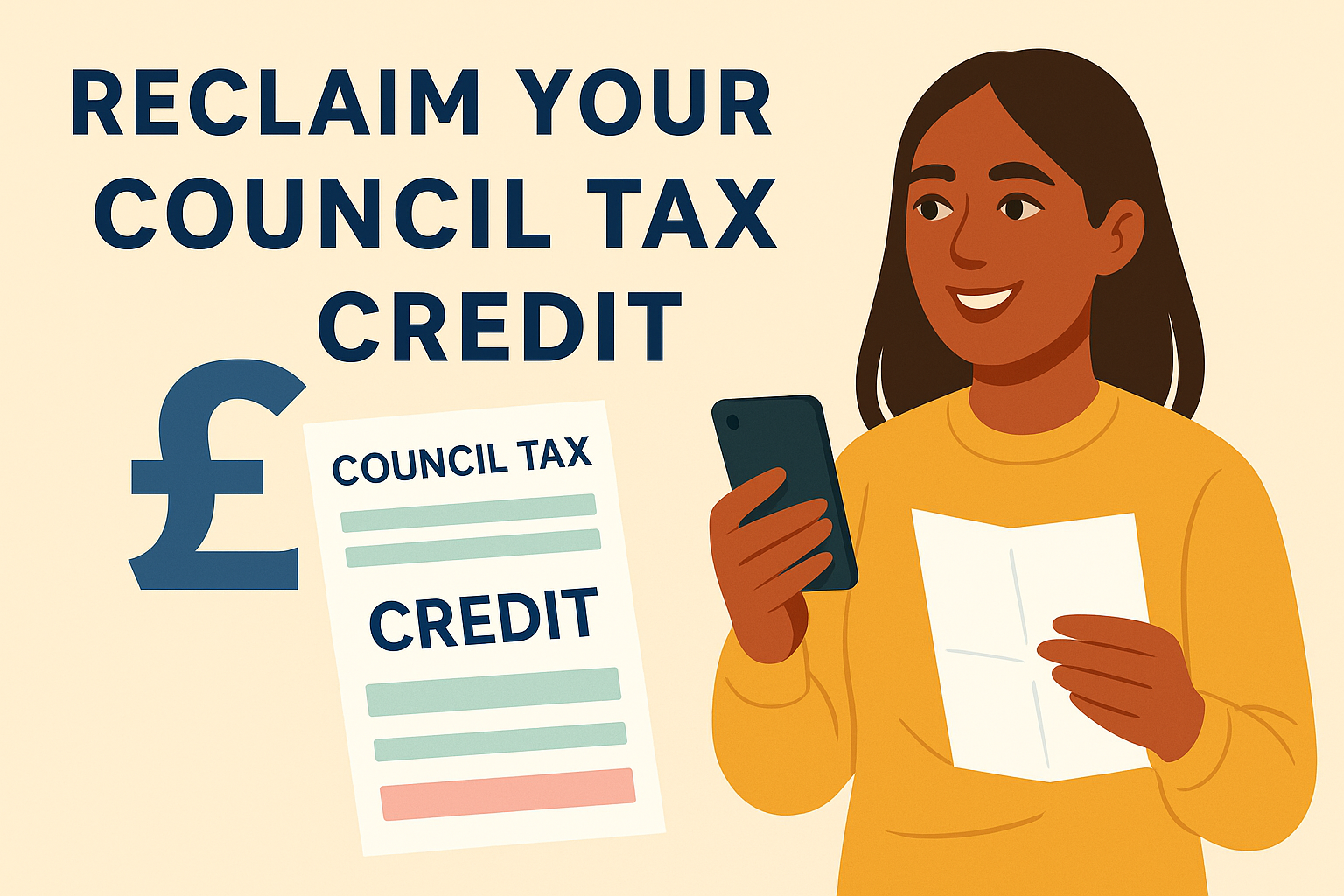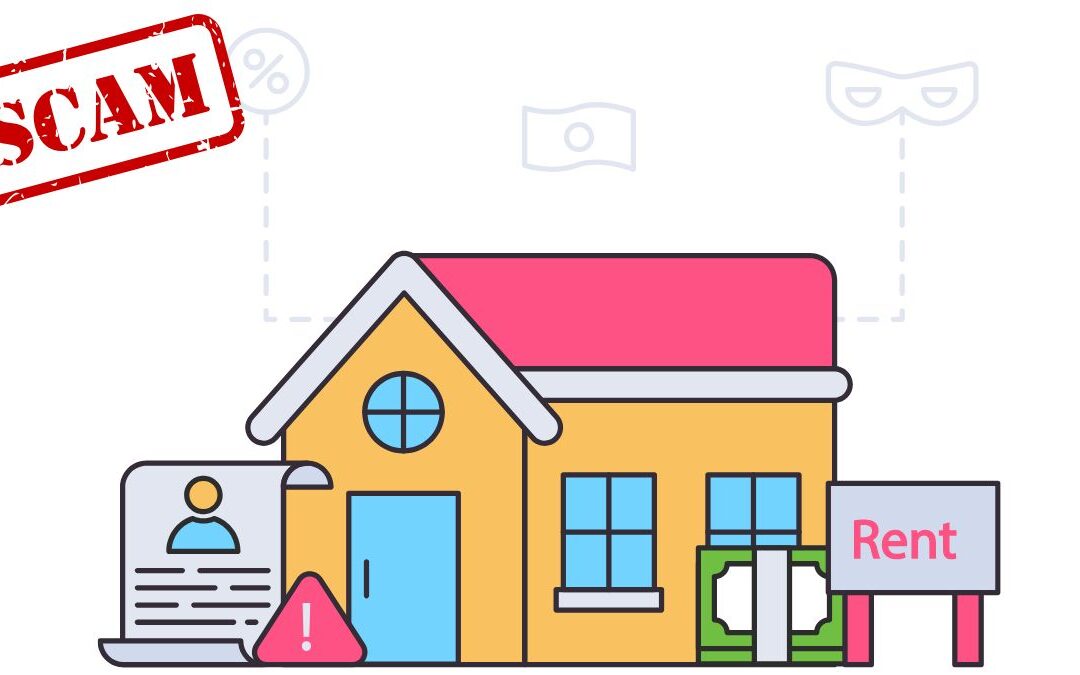
by Soniya Basu | Jul 3, 2025 | Housing
If you’ve ever moved home, changed councils, or overpaid council tax—there’s a good chance you could reclaim council tax credit that’s just sitting there, waiting to be claimed. Thousands of people across the UK are entitled to a Council Tax refund, and many don’t even know it.
Here’s everything you need to know to check if you’re owed money and how to claim it back fast.
What Is a Council Tax Credit?
When you move out of a property before the end of your billing period, you may overpay your council tax. That overpayment becomes a council tax credit. But councils don’t always refund this automatically, especially if you forget to update your address.
That means millions of pounds in council tax refunds are unclaimed each year.
You can find your local council using Gov.uk’s tool and search their website for a “council tax refund” or “council tax credit” section.
Who Is Most Likely to Be Owed?
You’re more likely to have a refund if:
- You moved home and paid council tax by direct debit
- You paid upfront for the year but moved out early
- You lived in a property with multiple tenants, and one left or overpaid
- You’re an international student or temporary resident who returned home without claiming back the credit
How to Check If You’re Owed Money
It’s surprisingly easy to check:
- Find out which local council you paid council tax to (you can use Gov.uk’s tool here)
- Visit your council’s website and search terms like “reclaim council tax credit” or “council tax refund.
- Look for a section that lets you claim a refund or submit a request
- If there’s no online form, email or call them with your old address, move-out date, and account number if you have it
💡 Tip: Include Any Joint Names
If you were on a joint tenancy or paid council tax as a couple or household, include all names that were on the bill. Councils sometimes register the credit under the first name listed.
Many of our readers are students who move frequently.
Opening a Bank Account as an International Student in the UK
How Much Could You Get Back?
Many people have been able to reclaim council tax credit amounts ranging from £50 to over £300, simply by checking with their local authority.
The average reclaim tends to fall between £70–£150, whatever the amount is, it’s your money.
There’s no legal time limit for claiming back overpaid council tax but councils are only legally required to keep records for a certain number of years (often around six). So, the sooner you check, the better.
At ScottishIndian.com, we know many of our readers are:
- Students who move frequently
- Families renting short-term accommodation
- NHS staff or care workers relocating often
It’s easy to forget these things during a busy move—but this small admin task could mean a welcome refund during tough times.
✍️ Template Email to Send Your Council
Here’s a quick message you can copy and paste:
Dear [Council Name] Council,
I’m writing to check if I have any outstanding council tax credit or refund due to me.
Name: [Your Full Name]
Old Address: [Your Full Address]
Move-out Date: [Date]
I paid council tax by direct debit. Please let me know if a credit is owed and how to reclaim it.
Thank you,
[Your Name]
Don’t let your money gather dust in a forgotten council account. Reclaiming council tax credit takes just a few minutes—and it could be a small windfall when you least expect it.
👉 Share this post with your friends, WhatsApp groups, or family—you might help someone else reclaim their money too.
And for more UK life hacks, savings tips, and support for South Asian communities, follow us at ScottishIndian.com.

by Soniya Basu | Jun 23, 2025 | Housing
Ever bought a drill, a waffle maker, or an ice cream machine only to use it once and stash it away forever? What if, instead of buying, you could just rent what you need—only when you need it? That’s the smart idea behind the Library of Things London is making famous. Why spend £50 on something you’ll use once, when you could borrow it for a fiver? Whether you’re a South Asian family planning a Diwali dinner, a weekend DIY project, or a one-off birthday bash, this concept makes more sense than ever—it’s affordable, clutter-free, and rooted in community living.
🛠 What Is the Library of Things in London and How Does It Work?
The Library of Things is like a public library, but instead of borrowing books, you can borrow things. Think of it as a desi parent’s dream—less waste, more savings.
You’ll find:
- Garden tools 🌿
- DIY & cleaning gear 🧹
- Kitchen appliances like popcorn makers and waffle irons 🍿
- Projectors for family movie night 📽
- Even utensils and cookware! 🍲
Perfect for a weekend function, Diwali prep, or just fixing up your rental flat.
Read our Desi Festival Guide here.
💡 What Is the Library of Things in London and How Does It Work?
South Asian families love hosting, cooking in bulk, fixing things ourselves—and being thrifty while doing it! But with space and budget constraints, especially for students, working couples, and extended families living in London or other UK cities, owning everything just isn’t practical.
Explore more budget hacks for UK Desi homes here.
Instead of buying expensive tools or large appliances you’ll use once, rent them at a fraction of the cost.
➡️ For example:
- Carpet cleaner rental: ~£6/day
- Sewing machine for altering that lehenga: ~£5/day
- Rice cooker or blender for a party: easily available!
🌍 Good for You, Good for the Planet
Renting instead of buying also means less clutter and less waste. It’s a sustainable choice—one we Desis already understand deeply (because didn’t we grow up sharing everything from Tupperware to TVs with neighbours and cousins anyway?).
This service fits the minimalist, eco-conscious lifestyle that more and more South Asians in the UK are embracing. Whether you’re in a student flat or managing a busy household, the Library of Things keeps it practical.
You can find Library of Things locations in parts of London like Crystal Palace, Hackney, and beyond. Check availability and book your items directly via their website:
🔗 libraryofthings.co.uk
And if you live in Edinburgh or Glasgow, why not start a community version? You could even use this idea for a South Asian neighbourhood co-op!
👉 For more life hacks, festival prep tips, and budget living ideas, explore our Culture & Lifestyle section.
Whether you’re a student, working parent, or part of a busy household, the Library of Things London has something for everyone—from garden tools to party gadgets. It’s the modern-day jumble of everything you need—without the clutter. 💡
The Library of Things London is more than a trend—it’s a cultural shift that fits perfectly with the ScottishIndian community’s values of sharing, practicality, and smart living.
Why buy what you can borrow?
Try it out.

by Soniya Basu | May 22, 2025 | Housing, Life in the UK
A simple guide for desi students, families, and newcomers | ScottishIndian.com
Whether you’re a student just setting up your room, a couple settling into a new flat, or a family watching your favourite Indian serials — there’s one question that often surprises newcomers in the UK:
👉 Do I really need to pay for a TV licence?
The answer is — probably yes (but not always).
🎯 What Is a TV Licence in the UK?
A TV Licence is a legal requirement in the UK if you:
- Watch or record live TV on any channel, including Sky, Freeview, BBC, ITV, etc.
- Use BBC iPlayer, even if it’s on your phone, laptop, or tablet.
This applies regardless of the device or service — whether you’re watching on a smart TV, mobile phone, Fire Stick, or even a gaming console.
💡 Yes, even if you only watch live Indian channels (like Zee, Sony, or Star Plus) via satellite, you’ll still need one.
🧾 How Much Does a TV Licence Cost?
As of 2025, the standard fee is £169.50 per year for a colour TV licence. You can:
- Pay in full
- Pay monthly or quarterly via Direct Debit
- Get a refund if you cancel it before the year ends (based on how much time is left)
You can register or manage your licence via the official site:
👉 tvlicensing.co.uk
👨🎓 Do Students Need a TV Licence?
Yes, if you watch live TV or use BBC iPlayer. But here’s the catch:
- If you live in a shared house, your room needs a separate licence unless your landlord provides one for the entire home.
- If you only stream on-demand content (like Netflix, Disney+, or Amazon Prime) and don’t watch live TV or BBC iPlayer — you don’t need a licence.
📢 ScottishIndian tip: Stick to streaming services and skip iPlayer if you’re on a budget.
🚫 What Happens If You Don’t Have One?
TV Licensing officers do door-to-door checks, especially in student-heavy areas. If they find you’re watching TV without a licence when one is required, you could face:
- A fine up to £1,000
- Legal trouble and court summons
Even if you don’t watch live TV, it’s best to declare yourself licence-free on the website — that way, you’re covered.
👉 Declare here: TV Licence – No Licence Needed
💸 Who Is Exempt or Eligible for a Discount?
- Over 75s: Can apply for a free licence (but only if receiving Pension Credit).
- Visually impaired people: Eligible for a 50% discount.
- Students: No discount, but you can apply for a partial refund if you only need it for part of the year (e.g. term time only).
The UK has many surprising systems, and the TV Licence is one that often confuses newcomers — especially those used to free-to-air or all-inclusive services in India.
But once you know the rules, you can avoid fines, save money, and only pay for what you actually use. Whether you’re binge-watching Bollywood on Netflix or catching IPL highlights on YouTube — if it’s not live or on iPlayer, you’re probably in the clear.
For more everyday survival guides for desi folks in the UK, check out ScottishIndian.com — your ultimate cultural companion abroad.

by Soniya Basu | May 1, 2025 | Housing, Life in the UK
(Essential tips for Indian students, professionals, and families moving to the UK | ScottishIndian.com)
Moving into your first flat or shared house in the UK? 🏠 Whether you’re an Indian student starting your university journey, a young professional chasing your career dreams, or a new family settling in, there’s one thing you absolutely must understand: your housing contracts.
At ScottishIndian.com, we guide Indian newcomers to the UK through every step of setting up life abroad — and understanding UK rental agreements is a big part of that.
Let’s decode it the desi way — simple, practical, and no legal jargon overload!
📝 What Is a Housing Contracts in the UK?
A housing contract (or tenancy agreement) is a legally binding document between you (the tenant) and your landlord or letting agent. It spells out:
- How long you’ll live there
- How much rent you’ll pay
- What responsibilities you and your landlord have
⚠️ Signing without reading properly = future headaches you really don’t want.
🏠 Key Types of Rental Agreements
- Assured Shorthold Tenancy (AST)
Most common for students and renters.
- Fixed period (usually 6 or 12 months)
- Landlord must protect your deposit in a government-approved scheme
- Lodger Agreement
If you’re renting a room in someone’s home where they also live.
- Fewer rights than AST tenants
- Easier (and quicker) eviction notice
- Company Let or Sublet
Less common, but some Indian professionals use corporate leases.
Always check permission if subletting!
📜 Top Clauses to Check Housing Contracts Before Signing
✅ Deposit and Deposit Protection
- How much is the deposit? (Usually 5 weeks’ rent max)
- Is it protected in a government scheme like DPS or MyDeposits?
Notice Period
- How much notice do you or the landlord need to give to end the contract?
- Break clauses allow early exit — lifesaver if plans change.
Inventory Check
- A detailed list/photos of the property’s condition at move-in.
- Protects you from unfair damage charges when you leave.
Bills Included?
- Especially important for students. Some rents cover electricity, gas, water, broadband — others don’t.
✅ Maintenance Responsibilities
- Who fixes the boiler, appliances, or leaks?
- Generally, landlords must handle major repairs.
✅ Guarantor Clause
- Many students will need a guarantor (someone who agrees to pay your rent if you can’t).
- Some accept international guarantors; others ask for UK-based ones.
🧠 Desi Tips from ScottishIndian.com
- Always get a written contract, even if renting from a “family friend.”
- Don’t pay cash deposits without receipts.
- View the property in person or through a trusted agency before transferring money.
- Negotiate rent if the property has been on the market for a while.
- Check for EPC (Energy Performance Certificate) rating — a warmer home = lower energy bills!
💬 Final Thoughts from ScottishIndian.com
Understanding your housing contracts in the UK is as important as your BRP or student ID. It protects you legally and financially — and helps you feel truly at home.
At ScottishIndian.com, we’re here to make your UK journey smoother — from housing help to cultural tips, travel hacks, and career advice.
📩 Need help reviewing a rental agreement or spotting red flags? Join our Forum or send us your questions — we’re here for you, desi-to-desi! 🏡💛

by Soniya Basu | May 1, 2025 | Housing, Life in the UK
Stay Smart and Safe with Tips from ScottishIndian.com
You’ve just landed in the UK — fresh excitement, new dreams, and the hunt for a place to call “home.” 🏡
But hold up: before you wire that deposit or sign anything, you need to know about one big trap many newcomers (especially students and migrants) fall into — rental scams.
At ScottishIndian.com, we’re here to make your transition smoother — whether it’s finding a job, a community, or a safe, scam-free rental. Let’s break down how you can spot rental scams in the UK and protect your hard-earned money.
🚩 Common Rental Scams Red Flags to Watch Out For
1. “Too Good to Be True” Deals
If you see a stunning flat in Central London or Edinburgh for an unbelievably low rent… something’s fishy. Scammers often post dream apartments at cheap rates to lure desperate newcomers.
✅ Tip from ScottishIndian: Always check rental prices on trusted sites like Rightmove or Zoopla to know the realistic market rate.
2. They Ask for Money Before You’ve Seen the Property
NEVER pay a deposit, admin fee, or first month’s rent without viewing the property in person (or at least through a legitimate virtual tour with the agent).
If someone says, “Just send the money to reserve it — you can visit later,” 🚨 big scam alert.
3. No Proper Paperwork
Every genuine rental should come with:
- A tenancy agreement
- Proof that your deposit will be protected in a government-approved scheme (like DPS)
- Landlord’s identity checks
If they’re rushing you or saying “no paperwork needed” — run, don’t walk.
4. They Only Communicate via WhatsApp or Facebook
While messaging apps are popular, official landlords or agents will eventually offer you formal emails, office phone numbers, and legit property details.
Be wary of those who refuse to meet or who pressure you to act quickly over chat.
🔥 Bonus Tips from ScottishIndian.com to Stay Safe:
- Always Google the property address.
If it’s listed on multiple sites with different landlords = 🚩
- Check if the letting agent is registered with bodies like ARLA Propertymark or Safeagent.
- If it’s a private landlord, politely ask for ID and proof of ownership.
- Always use a credit card when possible for payments — it offers extra protection compared to wire transfers.
📢 If You Suspect a Rental Scams:
- Report the listing to platforms like Rightmove, Zoopla, or SpareRoom.
- Contact Action Fraud UK to report rental fraud.
- Warn others in your desi/Indian student WhatsApp groups and community forums.
💬 Final Thoughts from ScottishIndian.com
Finding your first flat in the UK should be exciting — not scary. By staying alert, asking questions, and refusing to rush decisions, you can avoid scams and find the perfect place to start your new chapter.
At ScottishIndian.com, we stand for community over confusion. From rental hacks to trusted service listings, we’re your guide to safe, smart living in the UK.
📩 Need help checking if a listing seems legit? DM us or post it in our Community Forum — our Scottish Indian fam is always ready to help!




